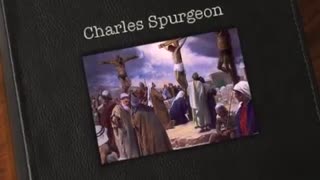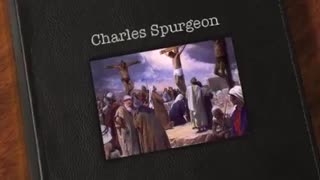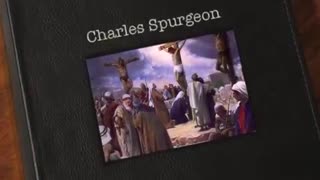Premium Only Content

Morning and Evening October 12th John 14:26 Psalm 119:15
Morning
"I will meditate in thy precepts."
Psalm 119:15
There are times when solitude is better than society, and silence is wiser than speech. We should be better Christians if we were more alone, waiting upon God, and gathering through meditation on his Word spiritual strength for labour in his service. We ought to muse upon the things of God, because we thus get the real nutriment out of them. Truth is something like the cluster of the vine: if we would have wine from it, we must bruise it; we must press and squeeze it many times. The bruiser's feet must come down joyfully upon the bunches, or else the juice will not flow; and they must well tread the grapes, or else much of the precious liquid will be wasted. So we must, by meditation, tread the clusters of truth, if we would get the wine of consolation therefrom. Our bodies are not supported by merely taking food into the mouth, but the process which really supplies the muscle, and the nerve, and the sinew, and the bone, is the process of digestion. It is by digestion that the outward food becomes assimilated with the inner life. Our souls are not nourished merely by listening awhile to this, and then to that, and then to the other part of divine truth. Hearing, reading, marking, and learning, all require inwardly digesting to complete their usefulness, and the inward digesting of the truth lies for the most part in meditating upon it. Why is it that some Christians, although they hear many sermons, make but slow advances in the divine life? Because they neglect their closets, and do not thoughtfully meditate on God's Word. They love the wheat, but they do not grind it; they would have the corn, but they will not go forth into the fields to gather it; the fruit hangs upon the tree, but they will not pluck it; the water flows at their feet, but they will not stoop to drink it. From such folly deliver us, O Lord, and be this our resolve this morning, "I will meditate in thy precepts."
Evening
"The Comforter, which is the Holy Ghost."
John 14:26
This age is peculiarly the dispensation of the Holy Spirit, in which Jesus cheers us, not by his personal presence, as he shall do by-and-by, but by the indwelling and constant abiding of the Holy Ghost, who is evermore the Comforter of the church. It is his office to console the hearts of God's people. He convinces of sin; he illuminates and instructs; but still the main part of his work lies in making glad the hearts of the renewed, in confirming the weak, and lifting up all those that be bowed down. He does this by revealing Jesus to them. The Holy Spirit consoles, but Christ is the consolation. If we may use the figure, the Holy Spirit is the Physician, but Jesus is the medicine. He heals the wound, but it is by applying the holy ointment of Christ's name and grace. He takes not of his own things, but of the things of Christ. So if we give to the Holy Spirit the Greek name of Paraclete, as we sometimes do, then our heart confers on our blessed Lord Jesus the title of Paraclesis. If the one be the Comforter, the other is the Comfort. Now, with such rich provision for his need, why should the Christian be sad and desponding? The Holy Spirit has graciously engaged to be thy Comforter: dost thou imagine, O thou weak and trembling believer, that he will be negligent of his sacred trust? Canst thou suppose that he has undertaken what he cannot or will not perform? If it be his especial work to strengthen thee, and to comfort thee, dost thou suppose he has forgotten his business, or that he will fail in the loving office which he sustains towards thee? Nay, think not so hardly of the tender and blessed Spirit whose name is "the Comforter." He delights to give the oil of joy for mourning, and the garment of praise for the spirit of heaviness. Trust thou in him, and he will surely comfort thee till the house of mourning is closed forever, and the marriage feast has begun.
===
Charles Haddon (C.H.) Spurgeon (19 June 1834 -- 31 January 1892) was a British Particular Baptist preacher who remains highly influential among Christians of different denominations, among whom he is still known as the "Prince of Preachers". He was a strong figure in the Reformed Baptist tradition, defending the Church in agreement with the 1689 London Baptist Confession of Faith understanding, and opposing the liberal and pragmatic theological tendencies in the Church of his day.
Spurgeon was a prolific author of many types of works including sermons, an autobiography, commentaries, books on prayer, devotionals, magazines, poetry, hymns and more.Many sermons were transcribed as he spoke and were translated into many languages during his lifetime. Spurgeon produced powerful sermons of penetrating thought and precise exposition. His oratory skills held throngs of listeners spellbound in the Metropolitan Tabernacle and many Christians have discovered Spurgeon's messages to be among the best in Christian literature.
http://conservativeweasel.blogspot.com/2011/10/daily-devotional-thursday-13th-october.html
AUAWN1013111
-
 4:06
4:06
Morning and Evening from Spurgeon
2 years agoMorning and Evening December 25th Job 1:5 Isaiah 7:14
199 -
 4:25
4:25
Morning and Evening from Spurgeon
3 years agoMorning and Evening October 6th Numbers 12:1 John 4:14
113 -
 4:54
4:54
Morning and Evening from Spurgeon
3 years ago $0.01 earnedMorning and Evening October 4th 1 John 2:1 Zechariah 14:7
152 -
 5:03
5:03
Morning and Evening from Spurgeon
3 years ago $0.02 earnedMorning and Evening October 1st Psalm 84:11 Song of Solomon 7:13
186 -
 4:20
4:20
Morning and Evening from Spurgeon
3 years agoMorning and Evening October 11th Romans 8:30 Lamentations 3:41
147 -
 4:33
4:33
Morning and Evening from Spurgeon
3 years ago $0.01 earnedMorning and Evening September 22nd Psalm 61:2 Psalm 149:2
398 -
 4:40
4:40
Morning and Evening from Spurgeon
3 years agoMorning and Evening October 10th Jeremiah 15:21 Jude 24
100 -
 4:24
4:24
Morning and Evening from Spurgeon
3 years agoMorning and Evening October 8th Jude 20 Luke 5:4
212 -
 4:28
4:28
Morning and Evening from Spurgeon
3 years agoMorning and Evening October 7th Isaiah 36:5 Numbers 11:11
97 -
 4:42
4:42
Morning and Evening from Spurgeon
3 years agoMorning and Evening October 9th Matthew 15:23 Jude 24
170